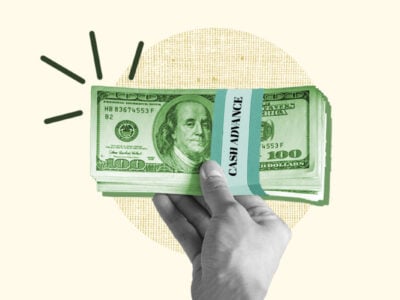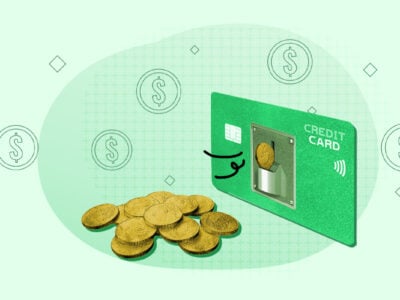If you’re strapped for cash and don’t have enough money on your debit card to make a withdrawal, you may be looking to use your credit card for a cash advance. A cash advance is a short-term loan that you take out through your line of credit, generally issued immediately at an ATM.
Before you commit to a cash advance, make sure you understand what a cash advance fee is and how much it will cost you.
Table of Contents
What’s a cash advance fee?
A cash advance fee is a surcharge you pay your credit card issuer when you withdraw money using a cash advance.
Cash advance fees are added to your credit card balance along with the cash advance itself (the amount you withdraw). Like the rest of your balance, they’ll come due at the end of your credit card billing cycle.
Do all credit cards have cash advance fees?
No, not all credit cards feature cash advance fees, although the majority do. If you frequently take out cash advances, it’s worth looking for one with no cash advance fee.
However, bear in mind that cash advances can be expensive for other reasons as well (such as the higher APR that we mentioned above). As we’ll explain further down in this article, it’s best to avoid taking out cash advances if you can, so most of the time, whether a card has a cash advance fee shouldn’t be a major consideration when you’re thinking about applying for it.
How much do cash advance fees cost?
How much a cash advance fee costs depends on the credit card, the card issuer, and the amount of the transaction.
Cash advance fees tend to be either a percentage of the transaction amount or a flat rate—whichever amount is greater. For example, a credit card may list its cash advance fee as 5% or $5, whichever is greater.
If your card features a fee like that, then if you take out a cash advance of $1,000 (for instance), your cash advance fee will be $50, because that’s 5% of $1,000. But if you only take out a cash advance of $50, your fee won’t be 5% of $50 (aka $2.50)—it will be $5, your card’s minimum fee.
Here are a few real examples of how much cash advance fees can cost on several common credit cards. 1 2
Examples of cash advance fees
| Credit card | Cash advance fee listed | Example cash advance amount | Cash advance fee charged |
|---|---|---|---|
| Chase Freedom Unlimited® | $10 or 5% | $500 | $25 |
| Capital One Venture Rewards | $10 or 3% | $100 | $10 |
| Surge Mastercard® | $5 or 5% | $250 | $12.50 |
As you can see, cash advance fees can vary widely. However, past the point where you’ve exceeded the card’s minimum flat fee, the more you withdraw using a cash advance, the higher your fee will be.
Additional fees associated with cash advances
On top of the cash advance fee and the cash advance APR, you’ll probably need to pay an ATM fee or processing surcharge. These fees also vary widely, but they can really add up.
All told, cash advances can be an incredibly expensive way to get cash from a credit card. If possible, we recommend finding another means of securing funds and reserving cash advances for emergencies only.
How can you avoid paying a cash advance fee?
Unfortunately, the only surefire way to avoid a cash advance fee is not to take out a cash advance in the first place.
However, there are a few other options that can sometimes get you out of paying a cash advance fee:
- Find a credit card that waives your first cash advance fee. This isn’t sustainable, but it can enable you to take out a single cash advance for free, which can help in a pinch.
- Contact your credit card issuer and ask them to waive your cash advance fee. They might be willing to do this once, but probably not as a regular thing.
- Borrow money from a friend, or offer to make a purchase for them on your credit card in exchange for cash.
If you desperately need cash and your bank account is empty, as an absolute last resort, you can also overspend on your debit card instead of taking out a cash advance. You’ll get hit with an overlimit fee, but it may be less than the cash advance fee coupled with cash advance APR.
To sum things up, cash advance fees can be exorbitant, especially when you consider how much interest your cash advance might accrue on top of that. If you can avoid making cash advances, do so. However, if you’re in a bind and need to withdraw money from your credit card, understand the costs so you’re prepared to pay the price.






